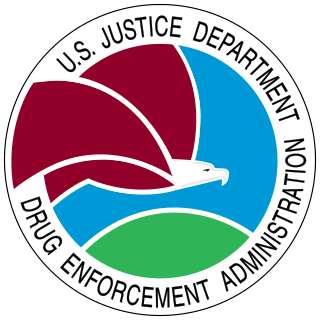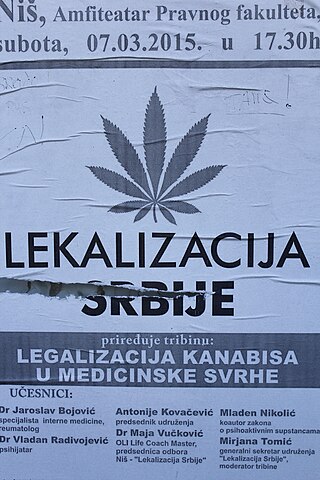
The Controlled Substances Act (CSA) is the statute establishing federal U.S. drug policy under which the manufacture, importation, possession, use, and distribution of certain substances is regulated. It was passed by the 91st United States Congress as Title II of the Comprehensive Drug Abuse Prevention and Control Act of 1970 and signed into law by President Richard Nixon. The Act also served as the national implementing legislation for the Single Convention on Narcotic Drugs.

The Drug Enforcement Administration is a United States federal law enforcement agency under the U.S. Department of Justice tasked with combating illicit drug trafficking and distribution within the U.S. It is the lead agency for domestic enforcement of the Controlled Substances Act, sharing concurrent jurisdiction with the Federal Bureau of Investigation, the U.S. Immigration and Customs Enforcement, and U.S. Customs and Border Protection although the DEA has sole responsibility for coordinating and pursuing U.S. drug investigations both domestically and abroad. It was established in 1973 as part of the U.S. government's War on Drugs. The DEA has an intelligence unit that is also a member of the U.S. Intelligence Community. While the unit is part of the DEA chain-of-command, it also reports to the Director of National Intelligence. The DEA has been criticized for scheduling drugs that have medical uses, and for focusing on operations that allow it to seize money rather than those involving drugs that cause more harm.
The National Organization for the Reform of Marijuana Laws is a social welfare organization based in Washington, D.C., that advocates for the reform of marijuana laws in the United States regarding both medical and non-medical use. According to their website, NORML supports "the removal of all penalties for the private possession and responsible use of marijuana by adults, including cultivation for personal use, and casual nonprofit transfers of small amounts" and advocates for "the creation of a legal and regulatory framework for marijuana's production and retail sale to adults". NORML also has a sister organization, NORML Foundation, that focuses on educational efforts and providing legal assistance and support to people affected negatively by current marijuana laws. NORML maintains chapters in a number of US states as well as outside the US in countries such as Canada, France, New Zealand, and South Africa.
Jon B. Gettman is a marijuana rights activist, a leader of the Coalition for Rescheduling Cannabis, and a former head of the National Organization for the Reform of Marijuana Laws. He has a PhD in public policy and regional economic development from George Mason University and is a longtime contributor to High Times magazine. Gettman filed a petition in 1995 to remove cannabis from Schedule I of the Controlled Substances Act that was eventually denied. A second petition was filed in 2002, with the Coalition for Rescheduling Cannabis, that remains under review by the Department of Health and Human Services. Gettman frequently publishes on the marijuana industry and is an Associate Professor of Criminology and Criminal Justice at Shenandoah University in Virginia.

In the United States, the removal of cannabis from Schedule I of the Controlled Substances Act is a proposed legal and administrative change in cannabis-related law at the federal level. It has been proposed repeatedly since 1972. The category is the most tightly restricted category reserved for drugs that have "no currently accepted medical use.”

The National Institute on Drug Abuse (NIDA) is a United States federal government research institute whose mission is to "advance science on the causes and consequences of drug use and addiction and to apply that knowledge to improve individual and public health."
The Alliance for Cannabis Therapeutics (ACT) is an organization supporting medical marijuana that was founded in 1981 by Robert C. Randall and Alice O'Leary. Randall was the first person known to have successfully used medical necessity as a defense against a charge of marijuana possession in violation of the Controlled Substances Act.

In the United States, the non-medical use of cannabis is legalized in 22 states and decriminalized in 9 states, as of April 2023. Decriminalization refers to a policy of reduced penalties for cannabis offenses, typically involving a civil penalty for possessing small amounts, instead of criminal prosecution or the threat of arrest. In jurisdictions without penalty the policy is referred to as legalization, although the term decriminalization is sometimes used for this purpose as well.

In the United States, increased restrictions and labeling of cannabis as a poison began in many states from 1906 onward, and outright prohibitions began in the 1920s. By the mid-1930s cannabis was regulated as a drug in every state, including 35 states that adopted the Uniform State Narcotic Drug Act. The first national regulation was the Marihuana Tax Act of 1937.

Veterans for Medical Cannabis Access (VMCA), which was founded as Veterans for Medical Marijuana Access (VMMA) reflecting the pejorative word "marijuana", is an Elliston, Virginia-based non-profit service organization designed to assist American veterans who wish to be able to use marijuana for medical purposes with a doctor's recommendation. VMCA works towards the freedom for veterans to discuss the medical use of marijuana with their doctors without the risk of reprisal.

The use, sale, and possession of cannabis over 0.3% THC in the United States, despite laws in many states permitting it under various circumstances, is illegal under federal law. As a Schedule I drug under the federal Controlled Substances Act (CSA) of 1970, cannabis over 0.3% THC is considered to have "no accepted medical use" and have a high potential for abuse and physical or psychological dependence. Cannabis use is illegal for any reason, with the exception of FDA-approved research programs. However, individual states have enacted legislation permitting exemptions for various uses, including medical, industrial, and recreational use.

Cannabis in Oregon is legal for both medical and recreational use. In recent decades, the U.S. state of Oregon has had a number of legislative, legal, and cultural events surrounding use of cannabis. Oregon was the first state to decriminalize the possession of small amounts of cannabis, and among the first to authorize its use for medical purposes. An attempt to recriminalize possession of small amounts of cannabis was turned down by Oregon voters in 1997.

In the United States, the use of cannabis for medical purposes is legal in 38 states, four out of five permanently inhabited U.S. territories, and the District of Columbia, as of March 2023. Ten other states have more restrictive laws limiting THC content, for the purpose of allowing access to products that are rich in cannabidiol (CBD), a non-psychoactive component of cannabis. There is significant variation in medical cannabis laws from state to state, including how it is produced and distributed, how it can be consumed, and what medical conditions it can be used for.

The International Nonproprietary Name dronabinol, also known under the trade names Marinol, Syndros, Reduvo and Adversa, is a generic name for the molecule of delta-9-tetrahydrocannabinol in the pharmaceutical context. It has indications as an appetite stimulant, antiemetic, and sleep apnea reliever and is approved by the FDA as safe and effective for HIV/AIDS-induced anorexia and chemotherapy-induced nausea and vomiting only.

Conant v. Walters, 309 F.3d 629, is a legal case decided by the United States Court of Appeals for the Ninth Circuit, which affirmed the right of physicians to recommend medical marijuana. The Court of Appeals affirmed the earlier decision of the United States District Court for the Northern District of California, which was filed under the caption Conant v. McCaffrey. Though the case involved chronic patients with untreatable diseases, the decision does not name these conditions as a prerequisite, nor does it limit drugs which may or may not be illegal.
Americans for Safe Access v. Drug Enforcement Administration was a case in which the U.S. Court of Appeals for the D.C. Circuit held that the DEA's denial of a petition by plaintiff Americans for Safe Access for removal of cannabis from Schedule I of the Controlled Substances Act survives review under the deferential arbitrary and capricious standard. 21 U.S.C. § 812(b)(1)(B) requires that cannabis be found to have no "currently accepted medical use" in order to remain in Schedule I. This DEA, pursuant to regulations that the court had approved in Alliance for Cannabis Therapeutics v. DEA, interpreted this to require "adequate and well-controlled studies proving efficacy" in order for cannabis to be removed from Schedule I. The court deferred to the agency's interpretation and found that substantial evidence supported the DEA's determination that such studies do not exist. This case was the third attempt to get the D.C. Circuit to order that cannabis be rescheduled.

Terms related to cannabis include:

The status of cannabis in international law is a century-old history. Cannabis reform at the international level refers, in the 20th Century, to efforts to increase restrictions on cannabis use under international treaties; in the 21st Century, generally to efforts to ease or update such restrictions.

U.S. President Joe Biden stated in February 2021 that his administration will pursue cannabis decriminalization as well as seek expungements for people with prior cannabis convictions. It can still be found on his campaign website under sentencing reform. As of October 2022, Biden pardoned thousands of people convicted of marijuana possession under federal law.
The removal of cannabis and cannabis resin from Schedule IV of the Single Convention on narcotic drugs, 1961 is a change in international law that took place in 2021, on the basis of a scientific assessment by the World Health Organization.









